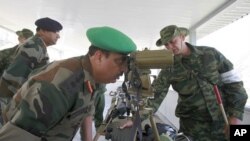India has emerged as the world’s largest weapons importer in the last five years, according to a Swedish research group.
Early next month, India will induct a nuclear submarine into its navy. Leased from Russia for about $900 million, it will boost India’s combat underwater capability. It will also make India the world’s sixth country to operate such a platform.
It is the purchase of sophisticated defense equipment such as warships and fighter aircraft that has propelled India to become the world’s top arms importer.
According to the Stockholm International Peace Research Institute, India accounted for 10 percent of the global arms market between 2007 and 2011, overtaking China as the world’s biggest customer for weapons.
Rahul Bedi with Jane’s Defense Weekly in New Delhi says India’s buying spree is motivated partly by the need to modernize its armed forces and partly by its ambitions to be counted among major regional or even global powers.
“Over the last 10 years, with its economic profile growing, it is seeking to project power outside not only its immediate area of concern, but to become a continental power rather than just a sub-continental power," Bedi explained. "So the acquisitions it is making, like aircraft carriers, long-range maritime reconnaissance aircraft, heavy lift transport aircraft, attack helicopters, now these are all power-projection platforms, which go far from home base.”
As India gets ready to spend an estimated $100 billion during the next 15 years to acquire new weapons systems, all major global armament companies have set up shop in India. Russia remains India’s largest arms supplier, followed by Israel, the United States and France.
Defense analysts say India also accounts for a huge chunk of global arms imports because it has failed to build a domestic defense industry. On the other hand, China has increased production of weapons during the past decade, lessening its dependence on imports.
But India still purchases more than three quarters of all its weapons overseas. Experts say recent efforts to nurture a domestic defense industry have made little headway because the private sector, widely seen as more efficient than the public sector, has largely been kept out of defense production.
Rahul Bedi says India’s defense industry needs to bridge a huge technological gap.
“It basically has mediocre engineering skills, but no developmental skills as far as weapon systems are concerned. So it is going to take another at least 20 to 30 years for India to meet even moderately its weapon requirements,” Bedi said.
India recently allocated $38 billion for its military budget this year - 17 percent higher than the previous year. That is far lower than China’s more than $100 billion budget for military spending.
In recent years, the biggest arms importers were all Asian countries - India, followed by South Korea, Pakistan, China and Singapore.
News
India Emerges as World’s Biggest Arms Importer






